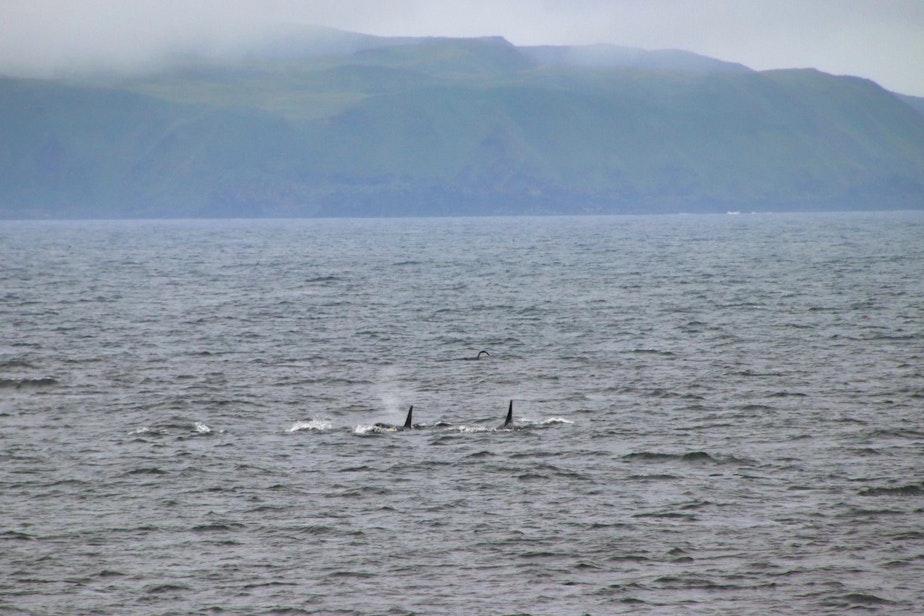10 orcas killed in Bering Sea, prompting calls for fishing reforms
Federal officials are looking into the deaths of nine orcas hauled up by groundfish trawlers in Alaska’s Bering Sea since May.
Conservationists say more needs to be done to prevent such deaths. They plan to protest outside a fishing industry gathering in Seattle, where much of Alaska’s fishing industry is based, on Thursday.
According to the National Oceanographic and Atmospheric Administration, another killer whale was released alive from a Bering Sea trawl net this summer.
A tenth orca died in the central Bering Sea in June when it got tangled on a “longline” being used to conduct an annual scientific survey of sablefish (also known as black cod) and other commercially important fish populations.
“NOAA Fisheries is analyzing collected data to determine the cause of injury or death and determine which stocks these whales belong to through a review of genetic information,” said Julie Fair, public affairs officer with the federal agency’s Alaska office, reading from a statement published Sept. 21 and first reported by the Anchorage Daily News. Fair declined to be interviewed, except to read the statement aloud.
Killer whales are protected under the Marine Mammal Protection Act, which requires boat owners or operators to report the deaths and injuries of the mammals during commercial fishing and survey operations.
Fair said NOAA Fisheries analyzes reports of “bycatch” — accidental harvests — of protected species to determine whether the animals were dead before being caught, or were killed or seriously injured by commercial gear.
Industry and agency spokespeople declined to identify the vessels involved or provide other details of these incidents, but Fair said the boats involved were all required to carry two federal observers on board.
This isn’t the first time killer whales have been caught in trawl gear off Alaska, but the numbers seem to have spiked in 2023.
“Nine, 10 killer whales is too many,” said Shari Tarantino, head of the Seattle-based Orca Conservancy, which advocates for the endangered southern resident killer whale population that roams from California to Southeast Alaska. “And if it’s just this year, something needs to be done in the future to mitigate these atrocities, frankly.”
Chris Woodley, head of the Groundfish Forum — the association representing 17 Bering Sea factory trawlers owned by five Seattle-area companies — declined to be interviewed, providing a written statement to KUCB and KUOW instead. It says that the fleet is committed to finding solutions to "this unprecedented challenge" and that vessels are experimenting with gear modifications to prevent whales from entering trawl nets.
The flatfish trawl boats voluntarily stopped fishing on Sept. 9, with more than three months left in the 2023 season, because of the orca bycatch.
Fishing boat encounters that harmed or killed orcas in Alaskan waters were rare until 2020, according to the Groundfish Forum statement.
NOAA reported just seven killer whale mortalities or serious injuries resulting from fishing gear entanglement in Alaska between 2016 and 2020.
“In 2023, our captains have reported an increase in the number of killer whales present near our vessels, where they appear to be feeding in front of the nets while fishing,” the statement reads in part. “This new behavior has not been previously documented and marine mammal scientists are not sure why this change has occurred.”

At least 1,000 fish-eating orcas are known to swim in the Bering Sea, according to a NOAA population estimate published in July. Their population is more than 13 times larger than the endangered fish-eating orcas of the Pacific Northwest, which currently number 75.
“Fisheries observers report that large groups of killer whales in the Bering Sea follow vessels for days at a time, actively consuming the processing waste,” the NOAA study states.
Tarantino said it’s important to protect the species, a top predator whose presence or absence can shape whole ecosystems.
“We're not saying stop trawling, even though I think trawling is unbelievably devastating to the ocean animals and the beings that live there,” she said. “But to continue taking this bycatch is just insane. It's destroying our future, in my opinion. You know, if the ocean goes, we go.”
Biologist Deborah Giles, the science and research director for the Washington-based nonprofit Wild Orca, said she wasn’t surprised when she heard about the nine orca deaths.
“I was glad that [NOAA was] finally recognizing it publicly,” she said. “Of course, my cynical brain wonders how often this is happening when it was not reported — or at least not released publicly. I'm very glad that this is going to be investigated.”
Giles said the industry needs to figure out a safe way to keep animals from interacting with fishing vessels and reduce bycatch of non-targeted species.
“We'd ask NOAA to come up with some new protocols for ensuring that this doesn't happen again in the future,” she said. “NOAA is responsible for marine mammals, like killer whales, and they're also responsible for making sure that the fisheries are not jeopardizing non-targeted species. And especially in the trawl industry, bycatch is massive, and it's unsustainable. Initially, what we need to know is what are they doing about this? What steps are going to be taken to minimize this?”
Activists with the “Stop Factory Trawler Bycatch” campaign planned to hold a protest Thursday outside the annual meeting of Genuine Alaska Pollock Producers at Seattle’s Four Seasons Hotel.
“Nothing I have seen yet clearly states which trawl vessels were involved,” anti-bycatch activist David Bayes said in a text message Wednesday afternoon.
“No wild Alaska pollock vessel was responsible for any orca fatality this year, and we are unaware of any such fatality in recent decades,” Genuine Alaska Pollock Producers said in a statement emailed Thursday morning.
In a written statement, NOAA spokesperson Julie Fair said the agency is working quickly to evaluate the orca-harming incidents and will share findings as soon as possible.

